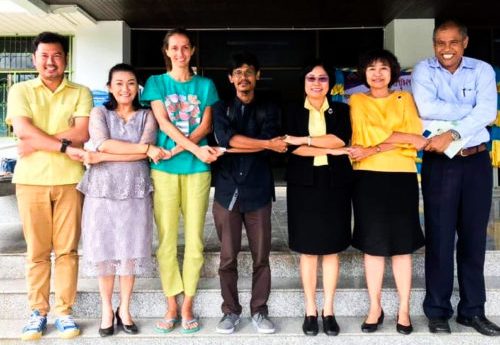
I was deployed in a small Muslim village of Kokpayom in southern Thailand, near seawater channels surrounded by mangrove forests. The main host organization, Dalaa, has made a long-term commitment to the village with an emphasis on education, lifelong learning, community development and environmental conservation.
It was my first field experience in Asia. Despite cultural differences, the hospitality of the local community has made us feel at home from the very beginning. Over the past six months, I have had the opportunity to work with local people and organizations and visit other project sites in different parts of southern Thailand. It gave me a good overview of rural development and how local communities can mobilize to be more active.
As an EU development volunteer, I had the opportunity to work on different initiatives of the host organisation and to improve my professional skills and knowledge by gaining valuable field experience. My work was mainly focused on education and community development.
I helped the host NGO develop more effective networking activities so that it could build stronger and more sustainable partnerships. One of my main tasks has been to help the NGO develop a more strategic partnership with the local community college, with the aim of promoting and supporting inclusive education, lifelong learning for better opportunities and community development. The two organizations are in the process of finalizing a memorandum of understanding that will formalize the partnership.
This was an excellent opportunity to put my professional expertise at the service of the local NGO to identify the needs of the community by developing the pilot phase of the Kokpayom community needs and strengths assessment and training local volunteers in this tool. The initiative for such a comprehensive assessment was the first of its kind for the community, as previous research was not so broad in scope and did not target the entire village population. The host NGO is now familiar with the evaluation tool and will use it again in the next phase of the evaluation in January 2019. The results of this project would help the NGO to improve its activities and programmes so that they can reach even more people in the village, meet the real needs of the community and provide new opportunities for learning, personal growth and development. In addition, the evaluation will contribute to the dissemination of local knowledge and skills and capacity building as the trained local volunteers (high school and university students) who helped conduct the survey will share this knowledge with their peers. The results of the pilot phase confirmed the credibility of the NGO and its key role in community development and empowerment.
One project that I fully accepted and worked on with great pleasure was related to children’s education and girls’ empowerment. I had the opportunity to teach in local schools and become familiar with the local education system. We also organized extracurricular activities to engage children and youth and encourage them to become active members of their communities. The village has created a new “Girls’ Club” whose activities are developed thanks to the creativity of the girls and more and more children are expressing their interest in joining it.
What I consider to be the most rewarding part of my volunteer experience is the opportunity to work closely with the local community, to have direct contact with it, to interact and learn from each other. Through the EU Aid Volunteering, I have seen how the local community is mobilising to meet its needs with local resources, and I have had the opportunity to help them in this process in order to increase their resilience. The hospitality and kindness with which the local population welcomed the volunteers contributed to the success of the deployment project and motivated me to pursue my professional development in this field.
Petya Koleva, Bulgaria
